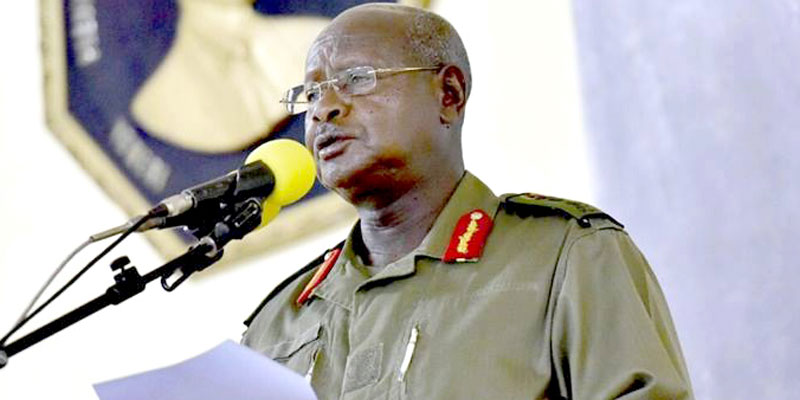Analysis
NRM plot for 6th term
Even before president Yoweri Museveni and his National Resistance Movement (NRM) party are given a clean bill of health by the Supreme Court that they beat their rivals fair and square, than the party has embarked on a multi-pronged strategy that will keep them in power beyond the constitutional mandate of five years.
Like the sole candidate scheme that started in Kyankwanzi and materialised in Namboole in November 2015, some NRM MPs this week confirmed long held rumours that the party wants to amend the constitutional to extend the term of office for the government from 5 to 7 years.
The MPs also want to introduce amendments that will remove the 75 year age limit that is prescribed by the Constitution as the oldest age for any presidential aspirant. There are no prizes for guessing who the initial beneficiaries of the proposed amendments will be.
And while no official statement is out yet on this matter, there is fear across the population that a sinister evil plan to have president Museveni rule for life is finally being cleared with these kinds of proposals.
More worrying perhaps is that given the party’s overwhelming majority in the coming 10th Parliament, no one will dare oppose it. This comes amidst an atmosphere of intimidation by the government using the police to crash the opposition.
Perhaps still feeling palpable anger and hunger in the way his government is doing business (service delivery) which he experienced during his recent campaign trail, President Museveni has come up with some proposals during the retreat that will likely draw some support from the masses.
For example, the president warned MPs and civil servants against agitating for salary increments.
According to NRM’s deputy spokesperson Ofwono Opondo, Museveni said: “What l want you MPs to avoid is to demand salary increment. It’s bad politics,”
Museveni reportedly rallied his NRM cadres to prepare for a rough road ahead in an effort to save money to help beat poverty out of Uganda. He said: “We must all tighten our belts to eradicate household poverty by helping people create wealth.”
Museveni campaigned on the ticket of banishing household poverty from households through the promotion of commercial farming.
Indeed, shortly after being declared winner by Dr. Badru Kiggundu’s Electoral Commission last month on Feb 20, the president held a meeting with soldiers working with Operation Wealth Creation (OWC) as well as top officials from the Ministry of Agriculture at J&M hotel in Bwebajja to draw up a plan on how to tackle household poverty.
Reliable sources have revealed to The Sunrise that the president was convinced that promotion of coffee growing holds the promise for poverty eradication in many areas, especially in the central region where coffee growing is an established tradition but also where the party is facing great opposition.
The source, who prefers anonymity, further reveals that the president directed Uganda Coffee Development Authority (UCDA) to prepare to distribute up to 96 million disease-resistant coffee seedlings to farmers starting with the forthcoming March to May rain season.
Although UCDA has been working with certified nurseries to distribute the coffee seedlings in recent years, the NRM government wants to take coffee production to a radical new level so as to eradicate poverty from most farmers of the crop.
Thanks in part to the government’s own destruction of the farmer extension system, distribution of farm inputs has been one of NRM’s greatest challenges with middlemen ripping off farmers and tax payers through the distribution of substandard or rotten seeds and poor chickens to farmers.
Now however, the government is trying to lobby the Mengo administration under Katikkiro Charles Peter Mayiga to champion the distribution of coffee seedlings to the king’s subjects across Buganda.
Using Katikkiro Mayiga’s popularity and proven mobilisation skills, the government wants to avoid the curse of giving farmers seeds that end up being abandoned, washed and cooked or are exchanged for Waragi or money.
But the government continues to face criticism especially from agricultural experts for failing to adopt a comprehensive approach to farm support that goes beyond seeds to include fertilizers, support for storage facilities, and ensuring active participation in ensuring that private players in the seeds and chemicals sub-sector observe minimum quality standards.
As Patrick Luganda, a seasoned agricultural communications expert once remarked, its not enough to give farmers free seeds if they can’t afford to purchase fertilizers. As Luganda rightly put it, seeds perform to their full potential only if given the relevant conditions of well ‘nourished soils’ water and good weather.
Governments in other countries such as Kenya have decided to play a role by not supplying free seeds but rather by subsidising fertilizer purchase. The result is that Kenyan farmers are now able to obtain a 50kg bag of mineral fertilizers at nearly 50% the cost of fertilizers in Uganda and their output per acre is much higher than us.
Comments



















